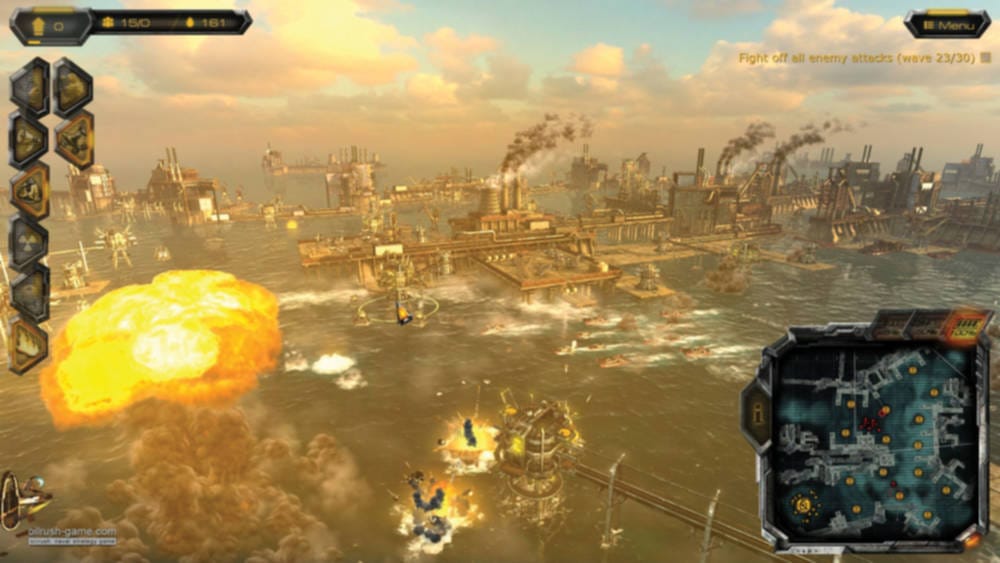Oil, oil everywhere...
Sanchit Sharma invades a country for it's natural resources. Oh, wait, no, to topple an evil regime

“Huh. Maxed out on oil again.” – Me, when playing Oil Rush. Oil Rush is an interesting take on the real time strategy genre. It is a naval strategy game that takes place in the future, where nuclear war has melted the polar ice caps leaving little habitable land on the planet. As such, many people live either on ships or on platforms that have been built in the sea.
Strategy in the game focuses around claiming and holding platforms in the ocean. There are two main types of platforms: oil rigs and unit construction platforms; the latter being further divided by which unit the platform provides. As such, the map is simply the placement of these platforms, the types of platforms, and small sections of land that block sea passage.
Each oil rig will produce as much oil as it can, until the maximum of 500 has been reached, and each unit construction platform will construct the relevant unit until the population limit has been reached. Note: it does not cost anything to produce units (presumably oil is the only resource that is limited, and no oil is needed to build these units).
This is one of two methods that the designers have employed to attempt to eliminate micromanagement in the game. The other method is unit selection – instead of selecting units individually the player selects a platform, combination of types of units, and then what percentage of them he/she wants. The game automatically chooses the ‘best’ combination.
Both of these methods are very effective in completing their goal – the game is very much focused on the big picture. However, this does mean that the player loses control. What if you want to send the already weakened unit to get itself killed distracting the enemy while sending the one at full health to capture a platform? The game doesn’t know which attack the player cares more about, and thus may send bad combinations of units.
There is another very important difference between the two main types of platform, which is that oil rigs must be defended by units, whereas unit construction platforms can have towers built around them for defence (towers cost oil, and are the main thing that you’ll use which do so). This leads to the main strategic choices in the game: how many units to leave behind whilst you send the rest to capture the remainder of the platforms.
And herein lies the main problem with this game. Whilst fun, there is very little strategic gameplay to be found. I can quite easily beat the normal AI simply by capturing and keeping two or three oil rigs, and then sending a large force to attack all of the unit construction platforms one by one. Some strategy is added by the fact that oil rigs cannot be defended, and there are also special powers that players can use (decrease enemy damage for x seconds, increase armour, etc) which increase the strategy somewhat as well. In addition to this, the fact that no unit or tower can be healed and each take time to be rebuilt adds something to this.
However, the fact remains that the most effective strategy is simply to leave behind very few units and attack as fast as possible.
There are two factions presented at the beginning of the campaign (effectively rebels and empire), but by the looks of things, these factions are entirely identical in terms of units and abilities – they exist in the game world purely to allow plot hooks. This is somewhat disappointing, as most real time strategy games give at least three factions all of which play differently, look different and have a variety of sub-strategies, such as Starcraft or the Command and Conquer series. This may have been done simply because Oil Rush is quite different strategically from most other games in this genre, however.
The music and graphics are both high quality and very appropriate for the game. In particular, the plane and ship models are really very detailed. The main campaign is very effective at taking you through the main unit types and strategies, though it does feel a bit like a very long tutorial. Things never really pick up. In addition to this there is simply a fixed set of missions as opposed to, like in Dawn of War: Soulstorm (I was trying to forget about that expansion. Curse you! – Games Ed.), a series of missions where the outcome of the last effects the next. Or Rome: Total War where there is a large scale campaign map as a turn based strategy game followed by individual real time battles. The addition of this kind of campaign would add a great deal to the replayability of this game. Overall, I quite enjoyed this game but I don’t think it would have been the cost if I’d have bought it at full price. Oil Rush is available from Steam or Desura now for £12.99, but I’d advise you to wait for the next Steam sale if you want to get it.







